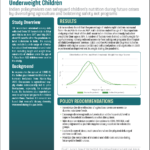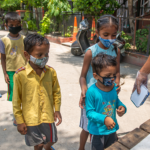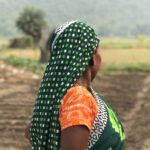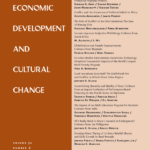Tag: Gender & Nutrition

Pandemic-Era Disruptions Linked to 14% Increase in Underweight Children
This policy brief presents the findings of a TCI study that examined the impact of the COVID-19 pandemic on children’s nutrition in India. Using TARINA survey data, researchers found a 14% increase in underweight children after pandemic-related lockdowns. Based on these results, TCI recommends that...

Did the COVID-19 Lockdown Reverse the Nutritional Gains in Children? Evidence from Rural India
Abstract Read a policy brief based on this study. To address the missing link that goes beyond the changes in dietary consumption and food expenditures to assess the impact of the pandemic on child undernutrition, specifically anthropometric outcomes, this paper uses primary panel data (pre-...

COVID-19 Pandemic Linked to 14% Increase in Underweight Children in India
The nutrition of Indian children suffered dramatically during the COVID-19 pandemic, according to new research from the Tata-Cornell Institute for Agriculture and Nutrition (TCI) that found a sharp rise in underweight children.
In a study published in Economic and Political…

Men’s Education Tied to Improved Household Nutrition
This policy brief presents the findings of a TCI study assessing the impact of men’s education on household and women’s dietary diversity, an indicator of overall nutrition. Using survey data collected as part of the TARINA project, TCI researchers found that men’s education has a...

Leveraging Men’s Education as an Effective Pathway for Improving Diet Quality: Evidence from Rural India
Abstract Read a policy brief based on this study. Investing in nutrition-sensitive sectors such as education can be an effective strategy for combatting malnutrition. In this paper, we analyze the role that men’s education plays in determining dietary diversity outcomes using primary data from 3600...

Well-Educated Men Mean Well-Nourished Households
Among development practitioners and policymakers, women’s education is a key tool for improving household nutrition, but according to new research from the Tata-Cornell Institute for Agriculture and Nutrition (TCI), men’s education also plays an important role in improving the nutritional…

From Policy to Progress: How Bihar’s Alcohol Ban Is Empowering Women
In the pursuit of a society where every woman finds solace within her home and community, away from the clutches of domestic violence and with assured equal rights, the state government of Bihar implemented a profound policy shift in 2016—a…

Alumna Pursues Gender and Nutrition Research at TCI
As a young girl, Soumya Gupta would accompany her father to the hospital, where he worked as a doctor. The image of impoverished women waiting for healthcare services in long queues impacted her deeply. She decided that one day, she…

Alcohol Ban and Crime: The ABC’s of the Bihar Prohibition
Abstract We study the relationship between alcohol consumption and crime, following an alcohol prohibition in Bihar in 2016. Using a difference-in-differences approach, we explore the differential effects of alcohol on different crime types. We find that the prohibition led to a 0.22 standard deviation point...

New Study Links Alcohol Prohibition with Drop in Violent Crime
Banning alcohol may be an effective tool for curbing violent crimes, according to a forthcoming study coauthored by a group of researchers including Tata-Cornell Institute (TCI) Scholar Natasha Jha.
The study, which is due to be published in the July…

